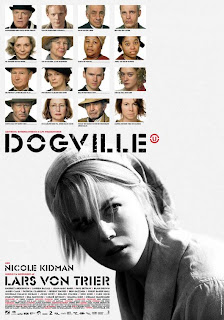"The future has not been written. There is no fate but what we make for ourselves. I wish I could believe that. My name is John Connor, they tried to murder me before I was born, when I was 13 they tried again. Machines from the future."
Introduction
It ain't that bad. Its no where near as bad as everyone said. Don't get me wrong, its no Jim Cameron movie, but it sure as hell isn't
GI Joe: The Rise of the Cobra. Again, in my attempt to blitz the Terminator franchise and understand what its all about I ploughed into the post
T2 sequels. The films everyone says are awful. I remember the release thinking "Wow, Clare Danes
does star in the big films still". Prior to this, everyone was pleased to have the duo of films that preceded - but, in the year of the trilogies (
American Pie 3, Matrix Revolutions, LOTR:The Return of the King...), it seemed the perfect time to release the third
Terminator movie. Why not hire the director of
U-571...
James Cameron hinted at a possible script for
T3 many times in the ninties before he left Linda Hamilton for
Titanic, but the studios were never going to say no to this franchise. The door was wide open. Interesting details from wikipedia:
The studios had long wanted to make a sequel to the Terminator films. However, they were unsure whether Arnold Schwarzenegger would appear in it. Schwarzenegger initially refused to star in Terminator 3 because Cameron, who created the character and helmed the first two films, would not be directing the third installment. Schwarzenegger tried to persuade Cameron to produce the third film. Cameron declined, however, as he felt that he had already finished telling the story upon the conclusion of T2. But feeling that the Terminator character was as much Schwarzenegger's as it was his own, he advised Schwarzenegger to just do the third film and ask for "nothing less than $30 million."
So, with 20% of the profits ging directly to Arnie - alongside a little over $29m - the stage was set.
Off the Radar
So many good aspects to this film - it truly is a shame it didn't fall completely into place. The late-teenager John Connor (Nick Stahl) has been 'off the radar' since T2. He has virtually deleted his existence from all the records that tracked him. It is fate that brings him back to Katherine Brewster (Clare Danes). Brewster and Connor, the night before the whole
T2 situation, got it on in at some mutual friends party - but, obviously, John Connor was never to be seen again after that whole debaucle. This 'character' development goes hand in hand with a clear, conscious connection to the previous installments. In the same as the previous installments Arnie arrives with the fire-in-the-background silhouette and the vast majority of the film is still set within an LA urban setting or a dusty Nevada desert.
In The Beginning ...
I heard recently about how Ridley Scotts up and coming prequel to the
Alien films will 'explain' where the Alien comes from. I additionally heard an opinion whereby the
Alien franchise does not need a history lesson. The fear of the alien is in the lack of knowledge behind the creature. In the same discussion, the same could be said about the terminator - but alas, clearly this was
directly what was wanted in this film. I feel that this is a double-sided sword - on the one hand we have a great starting point of research: how did the terminator develop? who was responsible for the machine itself? In
The Terminator no explanation was given - the terminator was to kill Sarah Connor and she had to kill the terminator to survive. And she does.
Terminator 2:Judgement Day expands on the universe - Sarah Connor needs to stop the accelerated-development of the artificial-intelligence to stop the nuclear war which will break out in 1997. This is averted.
Terminator 3:Rise of the Machines reveals that the development of A.I. continues and that Judgment Day has not been averted. But, instead of a small case of 'kill one guy and everyone is knocked out' scenario, John Connor has to face SkyNet himself to stop the nuclear attack... despite the terminators initial objective only to
protect John and Kate from the fall out. Obviously, by going into SkyNet and seeing their machines we also witness the birth of the machines ... the first terminators. A nice touch I felt.
A New Woman
In skin-tight leather we see the new terminator - with weaponary that fires out of her hand and she can control machines. This whole 'step-up' from the Robert-Patrick-terminator of
T2 is clear and, in another homage to
T2 we see an update truck chase and attack on John Connor as the terminator protects him. Its bigger and brasher but I think the huge scale of this seems a little too much - as if the budget simply went a little too far. But it is in the final act where it all falls apart...
Arnie Goes Bad
Everyone remembers
The Terminator and, to some small extent, we want to see the terminator in destroy mode - rather than protect-mode. I think this finale is a cheap attempt at making this possible as he glitches and switches between kill/protect John Connor - to the point that we see
multiple helicopter explosions. Wholly unneccessary. One helicopter crashing down as a smaller, leaner helicopter additionally crashes down into the previous helicopter - and we have a terminator-on-terminator fight. As Kate and John run away.
I don't think the film is perfect - but we have to accept the plus points. Nick Stahl held his own as Connor, the look of the film and some sequences have great parrallels to the previous films and it sits well in the canon that is the
Terminator Franchise. But its got little depth - maybe 'accept your fate'? Because thats what happens - everything seems a little pointless by the final reel. Judgement Day comes and goes - and this ultimately negates
T2 too ... lets hope
Terminator Salvation resolves some of these problems. Will the next John Connor please stand up...










